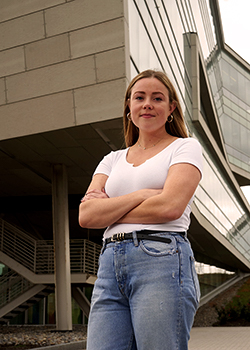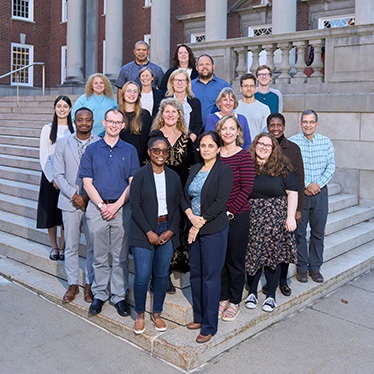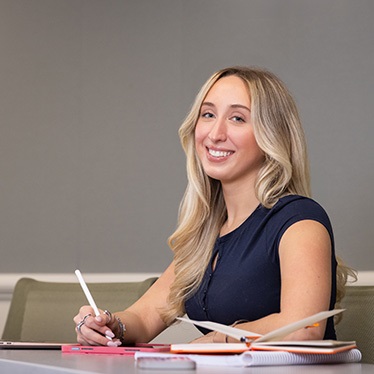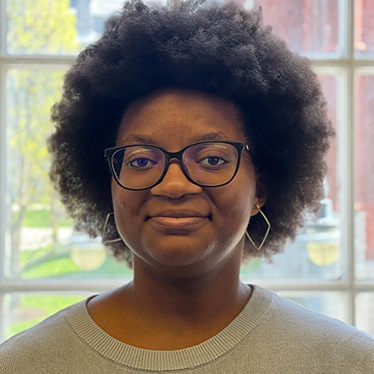A Bachelor's at Maxwell: Tapping into Maxwell's Best
January 13, 2020
Related:
UNDERGRADS@MAXWELL
Tapping into Maxwell’s Best
The School’s traditions of interdisciplinary study, community engagement and immersion, graduate-style instruction, and breadth of perspective combine in hallmark undergrad programs.
Taking stock of the Maxwell experience for those pursuing a bachelor's degree
- >> A Bachelor’s in Maxwell
- >> Tapping into Maxwell's Best
- >> New Knowledge
- >> Being There
- >> Guidance
- >> Worthy Endeavors
Meg Fitzgerald, a senior from Billings, Montana, came to Syracuse planning to double-major in political science and English, with an eye toward law school eventually. She also had a long-standing interest in environmental issues, and in her first few years at Syracuse she tailored her political science coursework, when possible, to learn about environmental policy.
So when she heard about the introduction of an integrated learning major (ILM) called Environment, Sustainability, and Policy, based in the Maxwell School but drawing on expertise across the University, she jumped at the chance to add a third major and weave her interests together.
Collaboration across disciplines “is actually baked into what we do at Maxwell.”
“The link between science and policy is critical but too often missing,” she says. “Thanks to the ILM, I know how to talk about global environmental change with considerations of legislative processes in mind.” She has also been able to apply this skill in the workplace, through internships with the World Wildlife Fund, the Washington-based strategic communications agency Vox Global, and SU’s Center for Sustainable Community Solutions.
Integrated learning majors like Environment, Sustainability, and Policy are part of a University initiative to offer majors in interdisciplinary or applied fields that students combine with a related base major. Maxwell professors contribute to ILMs on ethics, energy and its impacts, and forensic science.
While integrated learning majors are a new type of curricular offering, their interdisciplinary approach has long been a hallmark of Maxwell, with its distinctive blend of public affairs and social sciences. Collaboration across disciplines “is actually baked into what we do at Maxwell,” says geography professor Jamie Winders, who helped develop the environmental ILM. “We work in offices that are spread throughout the building; the actual design of our space is meant to facilitate interdisciplinary engagement. We don’t stay in our own little worlds.”

Maxwell has long tapped into this interdisciplinary character—and the expertise of its graduate programs and research centers—to offer unique opportunities for undergraduates. Plus, building on its commitment to citizenship and public service, Maxwell has also long found ways to extend learning beyond the classroom and into the community.
In recent years, such programming has continued to grow. Perhaps the most prominent example is the Maxwell Program in Citizenship and Civic Engagement, introduced in 2013. It builds on the foundation of the School’s long-running MAX courses, team-taught by faculty from across the social sciences, which explore contemporary domestic and global issues. Then students expand their knowledge and experience through community placements, independent research, and the creation of an Action Plan outlining concrete steps to address a social issue.
For instance, Catherine Porter (who is also majoring in policy studies, with a minor in Spanish) became interested in housing justice through her coursework, and then dug deeper to learn about how these issues affected the local community.
“I originally completed my community placement at the Syracuse Housing Authority and have learned immensely about the variety of housing problems Syracuse faces,” she says. Now, for her honors thesis and Action Plan, she’s interviewing members of a local tenants’ union and creating a handbook on tenants’ rights.
Maxwell’s international relations major also draws on the approaches of all the social sciences to understand contemporary global affairs. The IR program has strong components of faculty-led research and experiential learning, including internships, study abroad, and participation in Model United Nations.
In the course known as Global Governance Practicum, taught by IR’s director of undergraduate studies Francine D’Amico, each class meeting is conducted like a UN session, with the students representing specific countries and agencies, and the team travels to conferences in New York City and Washington with thousands of student delegates from around the world. The teams do intensive research on their countries, write position papers, and learn to deliver extemporaneous speeches in response to events that unfold during the conference. (In addition to student immersion, it pays off for the School’s reputation. Maxwell’s Model UN teams routinely win awards for team and delegate excellence.)

“My public speaking, negotiation skills, and intercultural communication have immensely improved,” says senior IR major Lara Hicks. “Model UN has boosted my confidence and my abilities to adapt in contentious situations.”
Maxwell’s undergraduates have always benefited from the presence of its graduate programs, and several initiatives are underway to further integrate graduate and undergraduate programs, such as a new combined, five-year BA/MA in international relations. Faculty from Maxwell’s graduate program in public administration and international affairs are also teaching, for the first time, in the policy studies BA program; this year PAIA professors Zach Huitink and Colleen Heflin introduced undergraduate courses on policy implementation and poverty policy.
Special opportunities for undergraduates come through Maxwell’s research institutes as well. For instance, the Tanner and State of Democracy Lecture series, sponsored by the Campbell Public Affairs Institute, both include a Q&A session where a dozen or so selected undergraduates meet privately with guest speakers, such as author and former NBA player Etan Thomas, Susan Carroll of the Center for American Women and Politics, and Ezra Levin, cofounder of the Indivisible Project.
All these enriched learning experiences—through coursework, research, collaboration, community engagement, and interactions with both scholars and practitioners—help students develop the broad skills applicable to whatever career paths they choose.
“Tomorrow’s careers will require individuals with critical and synthetic thinking, analytical and analogical reasoning, written and oral presentation skills, and diverse and global experiences,” says Maxwell Dean David Van Slyke. “That’s a tall order for any university, school, or program. But at the Maxwell School, these have always been our goals, and undergraduates will find professors, staff, fellow students, and alumni who share this broad outlook.”
By Jeffrey Pepper Rodgers
This article appeared in the fall 2019 print edition of Maxwell Perspective © Maxwell School of Syracuse University. To request a copy, e-mail dlcooke@maxwell.syr.edu.
Related News
School News

Jan 7, 2026
School News

Dec 5, 2025
School News

Dec 4, 2025
